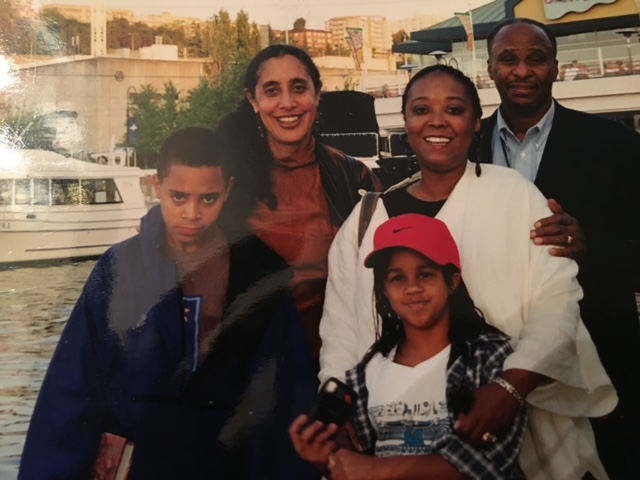Photograph: (fr, L to R) Nikolas Bowie, Mariah Moore; (bk, L to R) Lani Guinier, Linda Wright Moore, Acel Moore
Lani Guinier, a trailblazing champion of voting rights and a brilliant legal scholar, died on Saturday morning, at the age of 71, from complications of Alzheimer’s Disease. Ironically, she is best known for a prize that evaded her. Selected by her law school classmate President, Bill Clinton, to head the Justice Department Office of Civil Rights, her nomination was withdrawn in a blaze of republican criticism of her scholarly writings.
That is the story of the public Lani. I knew her in a different way: I met her as the wife of Nolan Bowie, a communications policy whiz and accomplished self-taught artist, who became a colleague and friend when he joined the communications school faculty at Temple University. Lani and Nolan were married in the summer of 1986, just before he started at Temple. They quickly settled in and made Philadelphia their home.
They were both smart, open, and easy to be with people, who fit in wonderfully with a circle of close friends in Philly. A tight knit bunch, we socialized regularly as grownups, discussing worldly issues and our own career challenges over dinner or at backyard cookouts. We also spent time together as Mommies and Daddies, hosting endless birthday parties for our little ones and festive Kwanzaa parties to ring in each new year.
Lani’s thoughtful brilliance was evident upon meeting her, but I didn’t drill down into her legal thinking until seven years later, when her nomination to be assistant Attorney General for Civil Rights started to unravel, as Republican conservatives maneuvered to frame her as “radical” and a “quota queen,” with “a strange name, strange hair and strange ideas.”
That certainly was not the Lani I knew – a woman with a loving heart, and a gentleness that belied her powerful intellect. By the time of her nomination controversy in 1993, I was an op-ed columnist and editorial writer at the Philadelphia Daily News, and I began drilling down into Lani’s legal writings and ideas, which it turns out – were not at all strange.
Her work focused on ways to make democracy stronger and better, a”more perfect union,” which can only be realized through collective and cooperative effort. Rather than a winner-take-all, zero-sum game approach to governing, Lani proposed applying the “principle of taking turns,” with the goal of accommodating “the values of self-government, fairness, deliberation, compromise and consensus that lie at the heart of the democratic ideal.”
Lani never got the chance to defend her thinking to her critics or to the public. Her nomination was pulled, and she was denied a confirmation hearing. But life went on. Lani went on to become the first woman of color to gain tenure at Harvard Law School, and a prolific scholar, who authored and co-wrote eight books during her stellar career.
Her ideas are both refreshing and relevant in this precarious moment, when elected leaders are paralyzed by partisanship and a “big lie” has been weaponized to erode voting rights, which Lani fought for and treasured. She understood that democracy is in jeopardy when citizens fail to step up, engage and work to keep it strong.
“Living in a democracy is not something we inherit,” she said in lecture excerpted on MSNBC after her death on January 7th. “It is not something we inhabit, and it is not something we consume. It is something we actively build together.”
So true. And a lot like the friendships she built, nurtured, and cherished. Rest well dear friend. Your old crew in Philly misses you and will love you always.
Linda Wright Moore is a writer living in Philadelphia.








